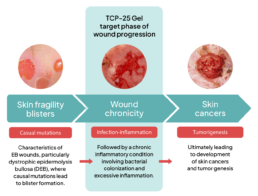Opportunity
The Need
Various wound conditions account for millions of deaths worldwide each year and trigger tremendous healthcare. It accounts for almost 4% of total healthcare costs, and this proportion is increasing, thus representing a significant and growing challenge to our healthcare systems.
Any damage to the skin barrier imposes a risk of infection and excessive inflammation and requires treatment. Current treatments are not optimal and antimicrobial resistance (AMR) to antibiotics increases – new cost-efficient non-antibiotic treatments are needed.
Epidermolysis bullosa (EB) is a severe and life-threating disease manifesting skin blistering, erosion, and ulceration with painful and difficult to heal wounds. There is a significant unmet medical need in patients suffering from EB and the disease has been described as “the worst disease you ever heard of”. Patients with EB have a lifelong challenge of extremely fragile skin with painful blisters and tears. The wounds are frequently super-colonized with bacteria and a long-term consequence of non-healing, chronically inflamed and infected EB wounds is the development of skin cancer.
EB is an orphan disease consisting of a group of rare genetic conditions each type caused by a mutation in a specific gene and there are four major types of EB: simplex, junctional, dystrophic, and Kindler. Approximately, 1 in every 20,000 newborn is affected by EB and globally hundreds of thousands of people are suffering from EB. Only in the US an estimated 20-30,000 people are living with EB.
TCP-25 Gel is well positioned as a novel treatment for EB-patients. TCP-25 Gel have the potential to improve wound healing by directly addressing bacterial colonization in EB wounds while simultaneously relieving excessive inflammation to promote more efficient wound healing and decreasing the risk of further complications that contribute to the significant disease burden of the patients suffering from EB.
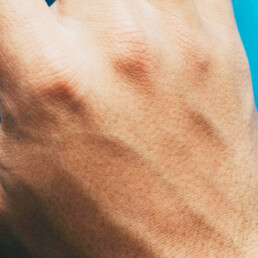
The Market
Wounds and injuries are one of the most common health conditions, effecting billions of people globally. Millions of people suffer from trauma and burns as result of accidents and violence and still more people acquire wounds due to complications from underlying diseases such as diabetes, obesity, cardiovascular diseases as well as rare diseases including Epidermolysis bullosa (EB).
The total global wound care market is expected to reach $28.6 billion by 2028 from $21.5 billion in 2023, a calculated annual growth of 5.9%. The advanced wound care market, which is our primary target market, is estimated to $12.6 billion in 2024. The total EB market size in the seven major markets was approximately $1.7 Billion in 2023, US only accounting for $1.3 Billion, and the market is expected to grow. Based on its unique position we believe that TCP-25 Gel will be able to cover a significant part of this market and not only in EB-wounds but also other segments of the advanced wound care market.
Examples:
- Epidermolysis bullosa (EB) affects 20-30,000 people in the US leading to multiple and life-long medical complications often requiring interventions from several different medical specialists. The annual cost for treating these patients is significant and exceeds $1 billion only in the US.
- Venous leg ulcer (VLU) is a type of complex difficult to heal chronic wound that represents the most common type of leg ulcer affecting as many as 1 in 300 people. The market was valued at $3 billion in 2023, with a significant growth projected to reach >$7 billion in the next 10 years.
- Acute burn wounds requiring medical treatment affect more than half a million Americans each year, resulting in 400,000 hospital stays and 4,000 deaths. The annual cost of treating these burns is estimated to be >$1 billion not including the indirect costs of disability and rehabilitation.
The Unique Concept
Efficient wound healing has been critical for survival during the evolution and healing has been shown to be a highly controlled and intricate process – complex and mastered by nature.
Inflammation is a critical part of normal wound healing and activation of the innate immune system is one of the first events in the process. The innate immune system consists of cells and various mediators such as macrophages and neutrophils, chemokines, cytokines, and antimicrobial peptides. These control the healing process, and one important function of the innate immune system is to manage infection, and microbial products that can drive inflammatory responses. However, when this healing process is disturbed, which is the case in patient with Epidermolysis bullosa (EB), chronic often infected wounds can develop, characterized by excessive inflammation and dysfunctional healing with pain, scarring and patients risk developing life-threatening conditions such as sepsis.
The Xinnate concept is based on our patented TCP platform, peptides which are a natural part of the innate immune system. The mode of action for TCP-25 is very well understood and published in high impact journals such as Nature Communications. TCP-25 is unique in its dual ability to dampen excessive inflammation and to manage infections and microbial products, known characteristics of dysfunctional wound healing.
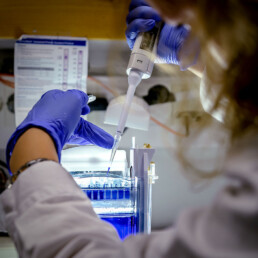
A
TCP-25 targets inflammation –release of inflammatory mediators, cell infiltration and wound exudate.
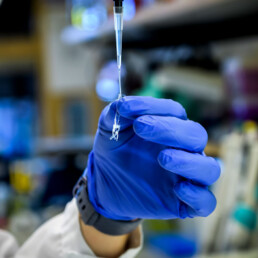
B
TCP-25 manages infection – scavenging of microbial inflammatory products (e.g. endotoxins) and direct microbial killing.
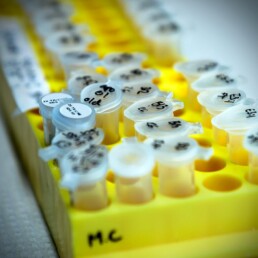
C
TCP-25 is part of our own natural innate defence system and has been shown to be safe and well tolerated in patients.
A. TCP-25 Gel targets inflammation
TCP-25 Gel is anti-inflammatory – naturally managing the paradox keeping the initial healthy level of inflammation and quenching the excessive damaging inflammation. Inflammation is a natural and necessary reaction during healing, but uncontrolled and excessive inflammation is a distinctive feature of impaired wound healing.
TCP-25 have been shown to dampen and normalize wound inflammation by reducing the release of inflammatory mediators from macrophages, infiltration of neutrophils into the wound area and wound exudation – improving the wound environment and healing. At the same time TCP-25 does not interfere with the important function of the innate immune to control infection.
B. TCP-25 Gel manages infection
Any damage to the skin barrier imposes a risk of infection. The bacteria and microbial products released from the bacteria (e.g. endotoxins) drives inflammation and if not controlled may shift the balance towards dysfunctional healing and chronic wounds. In severe cases, bacteria and endotoxins can be released into the bloodstream and cause a systemic excessive and sometimes lethal inflammatory response, i. e. sepsis.
TCP-25 has a direct killing effect on gram-positive and gram-negative bacteria, including bacteria resistant to antibiotics, and fungi. In addition, TCP-25 binds directly to and blocks the endotoxins released from bacteria and fungi and it blocks the receptors for these endotoxins on innate immune cells – disarming the bacteria.
C. TCP-25 Gel is safe and well tolerated
The origin of the active ingredient in TCP-25 Gel is a natural antimicrobial peptide released from thrombin during clotting and wound healing. To add a surplus of this peptide in the form of TCP-25 Gel to a wound has been demonstrated to be a safe and effective way to promote wound healing –in animal models and in humans.
TCP-25 Gel is effective on both the inflammation and the infection – no drug with a similar dual effect exists today. This broad biological effect enables an extensive range of target indications, such as inflammatory skin diseases, acute and chronic wounds, but also other applications such as post cosmetic treatment and coatings of surgical sutures and other biomaterials in contact with skin (catheters, ostomy, skin replacement materials). Our primary focus is to develop TCP-25 Gel for treatment of the chronic and devastating wounds seen in people with Epidermolysis bullosa (EB).
The Competition
Current topical wound treatments are based on anti-infective components (iodine, silver, PHMB). These substances are all, in different ways, potentially harmful for the environment and/or the patient. Systemic infections are typically prevented and treated with antibiotics. However, the excessive utilisation of antibiotics has generated a range of bacteria that are resistant to treatment – this problem is increasing.
We need more efficient and sustainable drugs that target infection and, maybe more importantly, inflammation at an early stage. There is a need to replace the current wound care treatments with more efficient alternatives without negative side effects, including the risk for antibiotic resistance.
TCP-25 Gel is the first in class wound treatment that has both anti-inflammatory and anti-microbial effects – also effective on multi-resistant bacteria. This opens a range of opportunities from treatment of inflammatory skin diseases such as Epidermolysis bullosa, treatment of difficult to heal wounds such as venous leg ulcers or burn wounds to applications such as post cosmetic treatment and coatings of surgical sutures and biomaterials in contact with skin (catheters, ostomy, skin replacement materials).
Our primary focus is to develop TCP-25 Gel for treatment of wounds in people with Epidermolysis bullosa (EB). TCP-25 Gel addresses an unmet need for these patients, targeting the excessive inflammation in the vicious cycle of EB wounds. Development of current therapies are focused on targeting the causal mutations associated with EB. But there is a significant unmet need for precise treatments specifically aimed at addressing excessive inflammation and bacterial colonization. Effective management of these inflammatory processes is crucial to improve wound healing and the overall quality of life for patients suffering from EB. TCP-25 Gel is well positioned to fill this gap.
